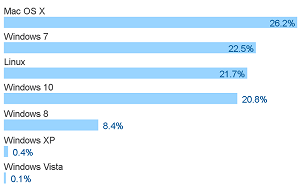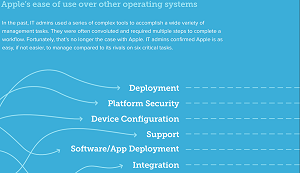Developers Should Take Heed of Apple's Enterprise Push
Programmers, who already favor Macs as their preferred dev machines, might be coding more Mac and iOS apps in the future, judging from new research that indicates Apple's enterprise push is succeeding.
"Consistent with Apple reports, Apple is gaining ground in the enterprise," said Jamf this week in announcing the new research. "Ninety-one percent of businesses use Mac and 99 percent use iPhone, iPad or both."
The report needs to be taken with a grain of salt -- Jamf says it's "solely focused on helping organizations succeed with Apple" -- but data collected for the company by Dimensional Research backs up other industry observations.
There's no doubt Apple already attracts the cool kids in the dev community. I don't know exactly when it started, but I remember being surprised to see many guests sporting MacBook Pros and such on Microsoft's Channel 9 developer videos. And a new preview for Visual Studio for Mac was big news in the rollout of Visual Studio 2017 this week.
 [Click on image for larger view.]
Check Out Aaron Roney's Laptop (Right) in this Channel 9 Video with Microsoft Exec Scott Hanselman (source: Microsoft)
[Click on image for larger view.]
Check Out Aaron Roney's Laptop (Right) in this Channel 9 Video with Microsoft Exec Scott Hanselman (source: Microsoft)
This stuff seems like sacrilege to some old-timers, but Microsoft is now catering to developers where they live -- and where the money is. As we reported last year about Stack Overflow's huge developer survey, "For the first time, more developers are using Mac than Linux as their primary OS."
 [Click on image for larger view.]
Stack Overflow Says Developers Prefer Macs (source: Stack Overflow)
[Click on image for larger view.]
Stack Overflow Says Developers Prefer Macs (source: Stack Overflow)
Now, having already conquered the high-end mobile device market and seen Mac OS X become the No. 1 desktop OS for developers, Apple is continuing its push into the next frontier -- the enterprise.
"User preference is driving Apple's penetration in the enterprise, and this demand for Apple is being met through device choice programs," Jamf said. "Nearly half of organizations surveyed (44 percent) offer employees a choice between Mac and PC, with the majority (71 percent) offering a choice between iPhone and other mobile device brands.
"It is clear that today's IT department is managing a mixed-device environment. When asked how managing Apple devices stack up against the competition, IT ranked Mac and iOS devices as easy, if not easier, to manage than other device brands."
 [Click on image for larger view.]
Easy to Use (source: Jamf)
[Click on image for larger view.]
Easy to Use (source: Jamf)
Though we've been reporting on Apple's enterprise push for some 15 years now, its efforts have ramped up of late. The company's best friend in this effort is IBM, especially when it comes to mobile and Apple's young Swift programming language.
"The growth of the Swift ecosystem among third-party developers is something of a phenomenon, and IBM appears to be leading that burgeoning pack," we reported last June. And in September IBM declared Swift was "ready for the enterprise."
And IBM is eating its own dog food. Big Blue reportedly has "the world's largest enterprise Mac footprint," adds 1,300 new Macs every week and says Apple machines save up to $543 per user.
But even beyond BFF IBM, Apple has been making enterprise partnerships with the likes of SAP -- including an SDK for iOS enterprise apps -- and Deloitte.
To support its enterprise incursion, Apple has rolled out many developer-oriented initiatives, including its Apple Developer Enterprise Program, where developers "Get tools and resources to transform your mobile workforce with enterprise-class iOS and Mac apps, distributed seamlessly and securely within your organization" for 299 per year.
According to Jamf, such efforts are paying off in the enterprise arena long dominated by Microsoft and Windows partially because of a demand for device choice.
"Standardization on a single device brand is a thing of the past," its report states. "Apple is gaining ground in the enterprise because employees prefer devices they use in their personal lives. In fact, the ability to work on a device(s) that an employee chooses and feels comfortable with largely impacts their productivity and job satisfaction. IT admins are adapting, finding that deployment, device configuration, security and support are easier with Apple than other operating systems."
In addition to the insight that 99 percent of companies now have iOS devices in use, while 91 percent have Mac users, Jamf listed the following key findings from the report:
- Usage of Mac (74 percent) and iOS (76 percent) devices increased over the previous year.
- Mac is as easy or easier to manage than PC on five critical tasks: deployment (62 percent), security (66 percent), device configuration (58 percent), software and app deployment (57 percent), and support (63 percent).
- iOS is as easy or easier to manage than other mobile devices when doing the following: deployment (93 percent), security (90 percent), device configuration (91 percent), software and app deployment (90 percent), and support (89 percent).
For the survey, Dimensional Research in January collected responses from 300 IT professionals, managers and executives from global commercial organizations with 50 to 10,000-plus employees.
Posted by David Ramel on March 10, 2017